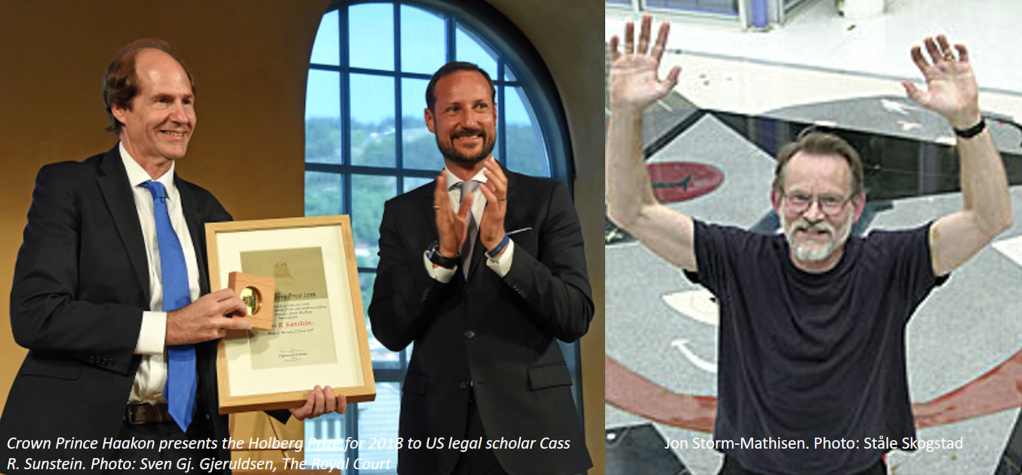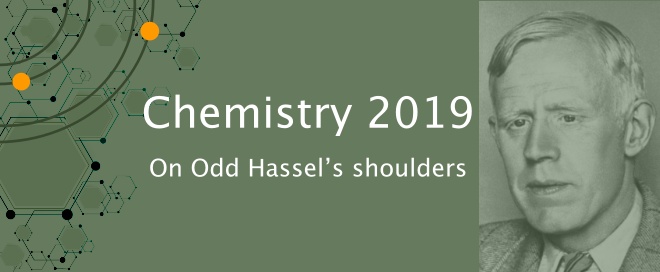Events - Page 3
There will be organised two workshops for potential applicants to new convergence environments. The first one was 18 February. Participation in one of the workshops is mandatory for submitting an application.
This event includes popular science talks by the research fellows of the ABINO project with expertise in biology, musicology, and physics.
There will be organised two workshops for potential applicants to new convergence environments. The second one will be 2 March. Participation in one of the workshops is mandatory for submitting an application.
We invite you to join scientists and philosophers from the UiO:Life Science convergence environment 3DR to discuss the clinical and biological challenges that come with the ethics of organ donation in Norway, and discover our source of inspiration to improve organ preservation for donation: the crucian carp inhabiting Norwegian ponds. This online seminar will include short presentations, a discussion and various activities (polls and Q&A sessions).
The ultimate boundaries of human reproduction lie at the limited availability of egg and sperm. The ability to create sperm and eggs in the laboratory opens up a new world of reproductive possibilities. Imagine a world in which same sex couples can have babies genetically related to both partners. Where the menopause no longer spells the end of a woman’s fertility. Where any individual, of any age, can produce both sperm and eggs.
Mental disorders are recognized as leading causes of disability and morbidity globally, and are among the costliest disorders to affect humans. The causal underpinnings of these disorders is a complex web of genetic, biological and psychosocial mechanisms. Recent advances in technology and computational techniques can help disentangle this complexity, leading to a further understanding of the conditions and subsequently better strategies for treatment and prevention.
We look at the climate crisis in a Hamlet perspective.
In the last decade, artificial intelligence has surpassed humans in among others the games of Go and Starcraft. Many researchers believe it's only a matter of time before we make an artificial intelligence that is smarter than humans in all areas. Most famous of these is Ray Kurzweil who predicts this will happen before the year 2050. But will this intelligence be conscious? What are the implications if it is or not? We invite to a panel discussion where these and other questions will be discussed.
The coronavirus caused the whole of Norway to shut down in the spring of 2020. What consequences has it had for the everyday life, leisure and household of most people? Has it had any effect on the climate and the economy? And what are the long-term consequences? When will life be like before the closure, or will it be?
At this digital seminar PhD students, postdocs and Master?s students in life sciences at UiO and NMBU have the opportunity to create networks outside academia.
The concert can unfortunately not be performed due to current corona measures and has therefore been canceled. "The Lapse of time" oratorio of excerpts from Charles Darwin On the Origin of Species composed by Bj?rn Morten Christophersen was to take place in Frogner kirke.
While philosophers have investigated the topic of consciousness for thousands of years, empirical research has only been a focus for the last decades. But in this time, what have we really learned about our internal experience of the world? We invite to a series of lectures focusing on how we investigate consciousness empirically, what we have discovered, and where the road goes next.
Using COVID-19 as an example, we focus on the role of life sciences in understanding and solving global societal challenges. What experiences have we gained one year after the pandemic started? Which research projects are implemented within the life sciences to prevent new pandemics in the future? What measures can we take to be prepared for a new global pandemic? And what efforts are taken to stop the COVID-19 pandemic globally?
Plants have been used for 1000s of years in the treatment of human diseases, though this historical knowledge is often lost. Our interdisciplinary research group uses Nordic historic texts and archaeological remains as inspiration to ‘rediscover’ what plants have historically been used to treat disease.
This year's Darwin Day event covers the topic of evolution and medicine. Speakers: Charles Swanton, Felicia Keesing, and Bruce Levin.
SPARK Norway Educational Forum are monthly open meetings organized by UiO:Life Science and SPARK Norway partners.
Do you want to join the application process in 2020/2021 for funding of new interdisciplinary research groups in life sciences? Then you should sign up for one of UiO:Life Science' meetings.
Do you want to join the application process in 2020/2021 for funding of new interdisciplinary research groups in life sciences? Then you should sign up for one of UiO:Life Science' meetings.
“The good, the bad and the ugly”. Why would we need a Centre for Healthy Ageing at the University of Oslo (UiO) and why should it be an inter-disciplinary approach? The 4th NO-Age meeting has compiled a high caliber inter-disciplinary speakers to share and discuss their expertise on such topics.
SPARK Norway Educational Forum are meetings organized by UiO:Life Science and SPARK Norway partners.
SPARK Norway Educational Forum are monthly open meetings organized by UiO:Life Science and SPARK Norway partners.
SPARK Norway Educational Forum are monthly open meetings organized by UiO:Life Science and SPARK Norway partners.
SPARK Norway Educational Forum are monthly open meetings organized by UiO:Life Science and SPARK Norway partners.
Having a new idea is not enough to create a new innovation. The hardest part is to build a successful business around it – this is the entrepreneurial challenge. One of the key elements that needs to be worked out is the right Go-To-Market strategy.
We invite the citizens of Oslo to an indoor light event with glimpses of life sciences at UiO. Free entrance for the duration of the event.
We have invited the oldest children in a kindergarten to join us "Programming: Bees and Flowers" at the Museum of science and technology.
The workshop will bring together people from different disciplines inside and outside academia in order to enable a dialogue on mimicry as a productive concept to understand and juxtapose industrial chemicals and synthetic hormones.
Nowadays the amounts of data generated presents unique opportunities in research and technological innovations. This also raises a range of challenges, including data standards, analysis and visualization, as well as ethical considerations such as data protection, privacy and ownership.
In this symposium we want to explore the increasing role that data plays in our lives. The event will explore research and technological innovations that involve data and the society.
For lower secondary schools.
An interdisciplinary panel from UiO consisting of neurologists, philosophers and psychologists shares their knowledge, gives us the latest news in brain research, disagrees a bit, but takes us on a journey into our own consciousness.
An interdisciplinary panel from UiO consisting of medical scientists, economists, philosophers and literary scientists. What do we know about aging, what is the latest in research on elderly and health, and how does our identity change at different stages of life? Existential questions and discussion.
What were the most important biotechnology debates in 2010? What will be important in 2020?
This year's Darwin Day event covers a moonshot for biology: Resolving all genomes on earth within a decade! Speakers: Kerstin Lindblad-Toh, Josefin Stiller, Maren Wellenreuther, and Tom Gilbert.
LMI and partners welcome you to join this day with presentations and discussions from the Norwegian life science ecosystem and industry leaders from Global Pharma.
For boys in upper secondary schools.
How are international regulations of pollutants followed up nationally and locally in Norway and Tanzania?
The workshop will bring together Norwegian and Tanzanian environmental authorities to address how international regulations on persistent organic pollutants are met nationally and locally.
What is happiness? What does it take to create and live a happy life? Is happiness more readily available to those who are able to see meaning in the little things? Is there any universal answer to what happiness really is to man?
NanoCosmos shows striking microscopy images from researchers in the convergence environment Programming Cell-Like Compartments. They will give you a glimpse into the nanoworld of soft matter and the microworld of cells – a "Wunderkammer" – where science becomes art. Join us for the opening February 11 at 18!
Climate change affects food production and food security. The way we produce food and what we eat affects the climate. Join us when we put self-storage, food safety, biodiversity and sustainable diet on the menu with experts from UiO and NMBU.
At this seminar PhD students, postdocs and Master?s students in life sciences at UiO and NMBU had the opportunity to create networks outside academia. Watch videos from the event.
In this seminar international experts and junior speakers from the UiO:Life Science convergence environment PerCaThe will discuss innovative methods for personalized and precision cancer therapy. Topics covered in the seminar include drug sensitivity screening, machine learning and combined mathematical, statistical and imaging methods for cancer modeling and simulation of drug treatment.
Collaboration between Pharma industry and Academia. The aim of the conference is to show how real world evidence (RWE) is changing the landscape for drug development and clinical use and to present RWE Initiatives that put the Nordic region in the forefront.
Refreshments and mingling in Oslo City Hall for all participants of the conference. You need at ticket to attend the reception. All who have registered, will get their ticket on email by the end of week 6. The reception is fully booked, but you may sign up for the waiting list.
At the Oslo Life Science Conference 5-year anniversary we looked ahead into the new decade. What will life sciences bring us in 2020–2030? What is the role of artificial intelligence (AI)? What are the visions for academia, hospitals and industry in a rapidly changing world where we need sustainable solutions? How can Oslo and Norway strengthen its position as a leading life science hub in Europe?
To develop your idea into a growing business you need an excellent and well-functioning team. Learn more about what it takes to build a team and establish and grow a successful business and use the opportunity to discuss with an experienced industry expert during this interactive seminar.
Forming a business partnership can be beneficial or even vital to obtain success, but it has to be done correctly. If not, it can be catastrophic. Learn more about what it takes to secure a successful partnering and finance setup. What are the pitfalls? What is critical? What are the dos and don'ts?
Procedures that work in the lab don’t always scale-up seamlessly into production in the life science industry. Process development while staying compliant will be required. What should be considered when you work in lab-scale to make the transition to production smoother? What are the common pitfalls, and what are the dos and don’ts?
Vi feirer 50-?rsdagen for Odd Hassels Nobelpris i kjemi: Program og p?melding til Hassel-seminaret 31. oktober til og med 1. november.
This symposium brings together world leaders in the ER proteostasis field in Oslo to showcase new research in this burgeoning field and its links to different aspects of normal cellular function as well as disease states, and aims stimulate new collaborative research.

























